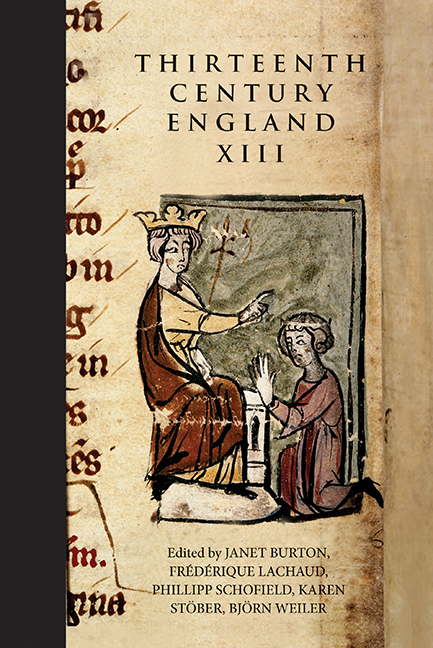Book contents
- Frontmatter
- Contents
- List of Illustrations
- Preface
- Contributors
- Abbreviations
- Political Ideas and Dialogue in England in the Twelfth and Thirteenth Centuries
- Peripatetic and Sedentary Kingship: The Itineraries of John and Henry III
- Peter of Aigueblanche's Support Network
- A Captive King: Henry III between the Battles of Lewes and Evesham, 1264–5
- The Conflictus inter Deum et Diabolum and the Emergence of the Literature of Law in Thirteenth-Century England
- Prosecuting Ravishment in Thirteenth-Century England
- John of Crakehall: The ‘Forgotten’ Baronial Treasurer, 1258–60
- Credit Finance in Thirteenth-Century England: The Ricciardi of Lucca and Edward I, 1272–94
- (Socio)linguistic Realities of Cross-Channel Communication in the Thirteenth Century
- The Treaties of Paris
Peter of Aigueblanche's Support Network
Published online by Cambridge University Press: 15 September 2017
- Frontmatter
- Contents
- List of Illustrations
- Preface
- Contributors
- Abbreviations
- Political Ideas and Dialogue in England in the Twelfth and Thirteenth Centuries
- Peripatetic and Sedentary Kingship: The Itineraries of John and Henry III
- Peter of Aigueblanche's Support Network
- A Captive King: Henry III between the Battles of Lewes and Evesham, 1264–5
- The Conflictus inter Deum et Diabolum and the Emergence of the Literature of Law in Thirteenth-Century England
- Prosecuting Ravishment in Thirteenth-Century England
- John of Crakehall: The ‘Forgotten’ Baronial Treasurer, 1258–60
- Credit Finance in Thirteenth-Century England: The Ricciardi of Lucca and Edward I, 1272–94
- (Socio)linguistic Realities of Cross-Channel Communication in the Thirteenth Century
- The Treaties of Paris
Summary
Peter of Aigueblanche, bishop of Hereford between 1240 and 1268, was one of Henry III's leading diplomats and one of his hardest-working and longest-serving supporters. It is true that his reputation has never recovered from his work towards the Sicilian scheme, for the funding of which he dreamed up the idea of getting the richer English abbeys to provide void schedules (in other words, sealed blank pieces of parchment, the medieval equivalent of blank cheques), and which of course proved to be a disastrous failure and a bottomless hole for mid-thirteenth-century English finances. Matthew Paris hardly ever mentioned Peter without criticism. However, in view of the length of time he worked for Henry and the scale of his achievements (treaties with Savoy and Castile, lengthy negotiations with Popes Innocent IV and Alexander IV, a final legal adjudication of the question of whether Henry had ever been legally married to Joanna of Ponthieu, assistance for the absentee Boniface of Savoy in running the diocese of Canterbury, and reporting to Henry on events in the Welsh Marches) some acknowledgement of his abilities is overdue. There is absolutely no question that he was useful to Henry, and also to Eleanor of Provence, in whose train he made his original entry into England. Peter's Savoyard origins gave him a handle on southern French and Italian events and personalities, but also a politically independent stance (Savoyards were subjects of the emperor, but in practice, even though loyal down to 1250, might go their own way). Moreover, his mother tongue would presumably have been Franco-Provençal, which would have enabled him to cope with southern forms of French, including the form of Occitanian spoken in Gascony, unlike French-speaking English people, who would be used to northern French in the form of Anglo-Norman. In addition, Franco- Provençal would have been closer than northern French to the Italian and Castilian he would have encountered on some of his embassies. We might note, for example, that Peter would have been better equipped linguistically than his partner on the 1254 Castilian mission, John Mansel. Above all, his tireless enthusiasm for work and travel must have endeared him to his employer. After a very brief biography and a comment on sources, this paper will then look at the various features of Peter's support network: the people in his employment, his property portfolio and his communication system.
- Type
- Chapter
- Information
- Thirteenth Century England XIIIProceedings of the Paris Conference, 2009, pp. 27 - 40Publisher: Boydell & BrewerPrint publication year: 2011

